
Toxicology Communications
Scope & Guideline
Sharing vital findings for health and environmental safety.
Introduction
Aims and Scopes
- Clinical Toxicology:
The journal emphasizes clinical toxicology, including case reports, treatment protocols, and management strategies for various poisonings and toxic exposures. This includes the use of antidotes, supportive care, and novel therapeutic approaches. - Epidemiology of Poisoning:
Research on the epidemiology of poisonings, including trends in substance use, demographic studies, and the impact of environmental factors on poisoning rates, is a core focus. - Toxicological Mechanisms:
The journal publishes studies that explore the mechanisms of toxicity at a biochemical and molecular level, contributing to the understanding of how various substances cause harm to human health. - Public Health and Policy:
Toxicology Communications also addresses public health implications of toxic exposures, advocating for policy changes based on empirical evidence and supporting the development of guidelines for poison management. - Emerging Drugs and Substances:
The journal keeps abreast of new psychoactive substances, drug overdoses, and trends in substance abuse, providing insights into their clinical implications and management.
Trending and Emerging
- Substance Abuse and Misuse:
There is a growing focus on the epidemiology of substance abuse, particularly regarding prescription stimulants and opioids, reflecting the ongoing public health crisis and the need for effective management strategies. - Impact of COVID-19 on Poisoning Trends:
Research examining the effects of the COVID-19 pandemic on poisoning incidents, including increased exposures to hand sanitizers and other household substances, is emerging as a vital area of inquiry. - Pediatric Toxicology:
An uptick in studies focused on pediatric poisoning cases indicates an increasing awareness of the unique vulnerabilities of children and the need for tailored interventions. - Environmental Toxins and Public Health:
Research on environmental toxins, such as PFAS and lead contamination, is gaining traction as public health concerns grow regarding the long-term effects of these exposures on population health. - Use of Technology in Toxicology:
Innovative methodologies, including the application of artificial intelligence and big data analytics in toxicology research, are emerging, showcasing the integration of technology in understanding and managing toxic exposures.
Declining or Waning
- Traditional Poisoning Treatments:
There has been a noticeable decrease in studies focusing on traditional treatment methods for poisoning, such as the use of activated charcoal, as new evidence-based approaches and antidotes gain prominence. - Occupational Toxicology:
Research related to occupational exposures and the toxicology of industrial chemicals appears to be declining, possibly overshadowed by the urgent need to address recreational drug use and environmental toxins. - Animal Envenomation Studies:
While still important, the frequency of case studies and research on animal venom (e.g., snake bites) has diminished, as the focus shifts towards broader public health implications and management of substance abuse. - Chemical Warfare and Bioterrorism:
The urgency of research into chemical warfare agents and bioterrorism appears to have waned, with fewer publications addressing these topics in recent years.
Similar Journals
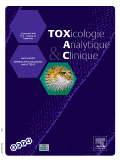
Toxicologie Analytique et Clinique
Shaping Tomorrow’s Toxicology Through Rigorous AnalysisToxicologie Analytique et Clinique is a distinguished journal published by ELSEVIER MASSON SAS EDITEUR, specializing in the ever-evolving fields of toxicology and clinical analysis. With its ISSN number 2352-0078 and E-ISSN 2352-0086, this journal has been contributing to the scientific dialogue since its inception in 2014, with a converged publication timeline extending to 2024. Despite its current standing in the Q4 category for both Health, Toxicology and Mutagenesis, and Toxicology in the 2023 metrics, as indicated by its rankings on Scopus, Toxicologie Analytique et Clinique remains a crucial platform for disseminating vital research within these domains. The journal's focus on analytical and clinical toxicology makes it an invaluable resource for researchers, practitioners, and students, seeking to enhance their understanding and methodologies in toxicological studies. As a vital contributor to the academic landscape, Toxicologie Analytique et Clinique aims to provide a rich repository of knowledge that promotes innovation and safety in clinical practices and environmental science.
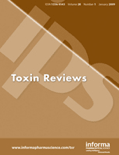
Toxin Reviews
Exploring the Complexities of ToxinsToxin Reviews is a premier academic journal focused on the critical field of Toxicology, published by Taylor & Francis Inc. Established with an aim to foster research and disseminate knowledge, this journal has been pivotal since its inception in 1982 and continues to be a leading platform for both emerging and established researchers. With an impressive impact factor and ranked in the 75th percentile among its peers in the Scopus categories, it serves as an essential resource for scientists, practitioners, and students interested in understanding the complexities of toxins and their effects on health. The journal provides an Open Access platform, enhancing visibility and accessibility of research findings to a broader audience. Covering a wide scope, Toxin Reviews plays a vital role in bridging gaps between toxicological research and practical applications, ensuring that rigorous scientific inquiry translates into real-world solutions.
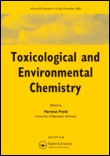
TOXICOLOGICAL AND ENVIRONMENTAL CHEMISTRY
Advancing knowledge at the crossroads of chemistry and health.TOXICOLOGICAL AND ENVIRONMENTAL CHEMISTRY is a pivotal journal published by Taylor & Francis Ltd, addressing critical intersections between environmental chemistry and toxicology since its inception in 1979. With its ISSN 0277-2248 and E-ISSN 1029-0486, the journal serves as a platform for rigorous research and innovative methodologies in pollution control, health implications of environmental chemicals, and the broader spectrum of toxicological studies. Although it currently does not offer open access, the journal's impact in the field is underscored by its Category Quartiles rankings in 2023, placing it in Q3 across Environmental Chemistry, Health, Toxicology and Mutagenesis, and Pollution categories. Furthermore, its Scopus rankings reveal its significant role within the scientific community, specifically in areas such as Environmental Science and Toxicology. The journal aspires to foster multidisciplinary dialogue and advance knowledge that contributes to environmental sustainability and public health, making it an essential resource for researchers, professionals, and students dedicated to these fields.

Toxicological Research
Advancing toxicological knowledge for a safer tomorrow.Toxicological Research is a prominent academic journal dedicated to advancing the field of toxicology through rigorous exploration and innovative research. Published by the Korean Society of Toxicology, this journal serves as a vital resource for researchers, professionals, and students engaged in environmental science, pharmacology, and toxicology. With an ISSN of 1976-8257 and an E-ISSN of 2234-2753, Toxicological Research highlights significant findings and discussions in the realm of health, toxicology, and mutagenesis. Although not an open-access journal, it maintains a solid reputation as evidenced by its Q3 ranking in both health-related toxicology and general toxicology categories for 2023. The journal covers a broad spectrum of topics from fundamental research to applied toxicology and provides a unique platform for the dissemination of knowledge in a field that is increasingly relevant in today’s society. With an anticipated convergence period from 2008 to 2024, Toxicological Research continues to contribute vital insights to understanding the implications of toxic substances on health and the environment.
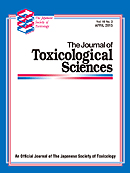
JOURNAL OF TOXICOLOGICAL SCIENCES
Innovative Insights into Toxicological ScienceThe Journal of Toxicological Sciences, published by the Japanese Society of Toxicological Sciences, is a prominent academic journal dedicated to the comprehensive study of toxicology and its related fields. Since its inception in 1976, the journal has provided a vital platform for researchers and professionals to disseminate innovative findings and insights in toxicology, with a focus on both experimental and clinical studies. Positioned in the Q3 quartile across various relevant categories, including Medicine (miscellaneous) and Toxicology as of 2023, the journal plays an essential role in advancing our understanding of toxic substances and their effects on biological systems. Although currently not open access, the journal maintains high academic standards and is indexed in Scopus, ranking #96 in Toxicology. Offering unique perspectives from Japan, it encourages global collaboration and discourse among toxicologists, making it an invaluable resource for students, researchers, and industry professionals alike.

Journal of Medical Toxicology
Advancing the Frontiers of Toxicology in MedicineThe Journal of Medical Toxicology, published by SPRINGER, is a leading interdisciplinary journal dedicated to advancing the understanding of toxicology and its implications in medical practice. With an ISSN of 1556-9039 and an E-ISSN of 1937-6995, this esteemed journal has been a pivotal resource since its inception in 2005, continuing to serve the scientific community through its convergence period lasting until 2024. Its prestigious positioning in the Q2 category in both Health, Toxicology and Mutagenesis, and Toxicology reflects its significant contribution and reputation within the field, recognized by impressive Scopus rankings in Environmental Science and Pharmacology. This journal delves into critical issues surrounding the diagnosis and treatment of toxic exposures, thereby aligning closely with both clinical and public health objectives. Researchers, professionals, and students can benefit from the robust analyses and innovative findings published within its pages, reinforcing the journal's role as an essential platform for knowledge dissemination in medical toxicology.

Current Research in Toxicology
Bridging Academia and Industry in ToxicologyCurrent Research in Toxicology is a pioneering journal published by ELSEVIER that serves as a vital platform for disseminating cutting-edge research in the field of toxicology, spanning from biological impacts to pharmacological applications. With an ISSN of 2666-027X and an impressive Q2 ranking in key categories such as Applied Microbiology and Biotechnology, Health, Toxicology and Mutagenesis, and Toxicology, this journal underscores its commitment to high-quality research and significant contributions to the scientific community. Based in the Netherlands, Current Research in Toxicology aims to bridge the gap between academia and industry by providing rigorously peer-reviewed articles that cover a wide array of topics including novel methodologies, regulatory challenges, and emerging trends within the domain. The journal is accessible through various platforms, making it essential for researchers, professionals, and students eager to stay updated on the latest findings and advancements in toxicology. With a comprehensive focus on integrating theory with practical application, this journal is poised to influence future studies and policies in health and environmental science.
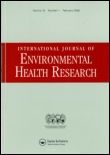
INTERNATIONAL JOURNAL OF ENVIRONMENTAL HEALTH RESEARCH
Illuminating the Path to Environmental Health EquityINTERNATIONAL JOURNAL OF ENVIRONMENTAL HEALTH RESEARCH, published by Taylor & Francis Ltd, serves as a cornerstone for interdisciplinary research focusing on the crucial intersections of environmental science and public health since its inception in 1991. With an ISSN of 0960-3123 and an E-ISSN of 1369-1619, the journal spans diverse topics related to environmental health, toxicology, and pollution science, holding high ranks in 2023 such as Q2 in Pollution and Public Health, showcasing its vital contributions to the field. Researchers will appreciate its robust platform as it features rigorous peer-reviewed articles aimed at unveiling the complexities of human health in relation to environmental factors. While the journal maintains a traditional access model, it ensures broad dissemination of high-quality research works. As a reputable source for both emerging and established scholars, the International Journal of Environmental Health Research offers critical insights and advancements pivotal to fostering a healthier planet.

Journal of Forensic and Legal Medicine
Advancing the Intersection of Law and Medicine.The Journal of Forensic and Legal Medicine, published by Elsevier, stands at the forefront of interdisciplinary research in the overlapping domains of law, medicine, and forensic science. With an ISSN of 1752-928X and an E-ISSN of 1532-2009, this esteemed journal covers pivotal advancements in the field, spanning from 2007 to 2024. The journal enjoys a distinguished reputation, evidenced by its Q1 ranking in Law and its notable positions in the Scopus Ranks with an 82nd percentile in Social Sciences—Law. As a crucial resource for researchers, practitioners, and students alike, the journal focuses on the vital role of forensic evidence in legal contexts, ensuring the dissemination of high-quality, peer-reviewed articles that contribute to both academic and practical applications in the realm of forensic and legal medicine. Its accessibility to a broad audience, despite not being open access, bolsters its importance in advancing forensic science, policy-making, and medical jurisprudence worldwide.
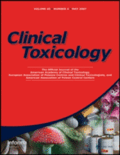
CLINICAL TOXICOLOGY
Your Gateway to the Latest in Toxicological ScienceCLINICAL TOXICOLOGY is a prestigious journal dedicated to advancing the field of toxicology, published by Taylor & Francis Ltd. With ISSN 1556-3650 and E-ISSN 1556-9519, it has been a vital resource for researchers, clinicians, and students since its inception in 1968. The journal is recognized for its high impact, boasting a Q1 quartile ranking in both the categories of Medicine (miscellaneous) and Toxicology as of 2023, reflecting its reputation for disseminating significant contributions to the field. CLINICAL TOXICOLOGY primarily features original research, reviews, and case reports that explore the latest advancements and methodologies in the diagnosis and management of toxic exposures, making it an essential tool for professionals seeking to stay abreast of current trends and best practices. The journal's open access options ensure that its content is readily available to a wide audience, thereby promoting the exchange of knowledge and collaborative efforts within the global scientific community. For those committed to improving public health outcomes through toxicological research, CLINICAL TOXICOLOGY provides an indispensable platform for publication and discourse.